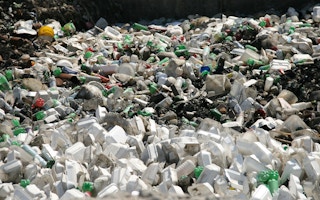The scourge of plastic products has reached the popular press and communities around the world—and in a big way, over the last six months.
To continue reading, subscribe to Eco‑Business.
There's something for everyone. We offer a range of subscription plans.
- Access our stories and receive our Insights Weekly newsletter with the free EB Member plan.
- Unlock unlimited access to our content and archive with EB Circle.
- Publish your content with EB Premium.
In response to the growing awareness of the plastic problem, more companies have taken action to reduce their plastic footprints. This month, Hong Kong and Shanghai Hotels, owners of the Peninsula Hotels, announced a ban on single-use plastic. Even fast food chain KFC moved to reduce plastic caps and straws for drinks this week in Singapore.
So what does it say about a company that continues to use single-use plastic?
Running out of excuses
On a daily basis, more people are impacted by trash and dirty water than by climate change. This is not to say that one problem is bigger than the other, but plastic pollution is one of the more complicated issues to solve as it is so widely dispersed.
Dirty water from trash impacts drinking water, hygiene, disease, tourism, and air pollution from open-pit burning of trash. It also impacts fishing, agriculture, maritime transport, and ecosystems on land and water, and the carrying of toxicity in broken-up micro plastic, which has entered the human food chain.
“
On a daily basis, more people are impacted by trash and dirty water than by climate change.
There are some easy solutions to reducing some of the blatant wastage caused by single-use plastic, with the ability to minimise the environmental damage it causes. This can be done by simply not using the plastic products which have clear alternatives, or are not even necessary, in the case of straws, stirrers, utensils, food service items and plastic bags for single drinks, as McDonald’s continues to serve against the trend of governments in the region to tax or ban disposable plastics.
The excuses companies give for using these items include cost, convenience, customer service, and hygiene protection. These rationales should no longer be used to justify transferring the cost of trash and ecosystem impacts to society, as there are many alternatives.
Yes, most of us in Asia live in busy cities, and people are on the move, but the use of single-use plastic by businesses reflects their lack of awareness of key issues, leadership, or care for the communities they serve.
We know these products are now avoidable. But in the case of where I am based, Hong Kong, a “free market”, it is not likely that legislation will be strong, effective or broad enough in scope to limit or abolish the use of these materials. Instead, we still see high-end restaurants, and even top five-star hotels, using plastic straws and swizzle sticks.
Switching to alternatives might not save the world, but the use of single-use plastics sends a distinct message to customers that the brand and its management is not on top of an issue of growing global importance.
It shows that their procurement is not thoughtful, and that they do not care enough for the communities they serve to make simple changes. The quest for a tiny percentage of extra margin, when using the excuse that the cost of alternatives is a factor, defines the reputation of that leadership and operation, and is not likely worth the negative image they are creating for themselves by continuing to sidestep a growing trend of reducing flagrant and unnecessary waste creation.
“
If hygiene is a concern that necessitates straw use, what about the hands that touch the straw before it is placed in the drink?
In Hong Kong and other Asian cities, the reflex response from staff, whether at a local coffeeshop or a five-star hotel, seems to be one of supplying plastic as part of the customer service. This is witnessed by how hard it is to try to receive a drink, including even ice water, without a straw in it, or in the case of McDonald’s and other takeout operations, without a plastic bag for a single drink in a cup.
If hygiene is a concern that necessitates straw use, what about the hands that touch the straw before it is placed in the drink? Sadly, laziness and convenience seem to have an inverse relationship with pride, both at the business and consumer level.
Without legislation to ban this unnecessary waste burden, we have to hope for a renewed sense of pride by restaurateurs and consumers, or somehow to convey a sense of guilt or shame towards those who still use disposable plastic.
Awareness, thoughtful procurement, and care for the cities we live in might lead us to build cities of pride where communities react to the sight and touch of single-use plastic and unnecessary packaging as if they could catch a contagious disease.
In many ways, single-use plastic and packaging is that disease, and it has slowly been absorbed into our daily lives without us realising it over the past twenty years.
Companies that are engaged on this issue will be the winners, while showing customers that they are doing their part to reduce unnecessary materials.
Legislation alone will not solve this global problem, and it will be up to each company and citizen to take pride in their actions, whether that is through enlightened procurement or their own behaviour as consumers.
It’s no longer “cool” to just throw things away because one is lazy or trying to save money, because much of that single-use material will be around long after our own lives, potentially impacting all kinds of environments along the way.
Doug Woodring is founder and managing director of Ocean Recovery Alliance


















